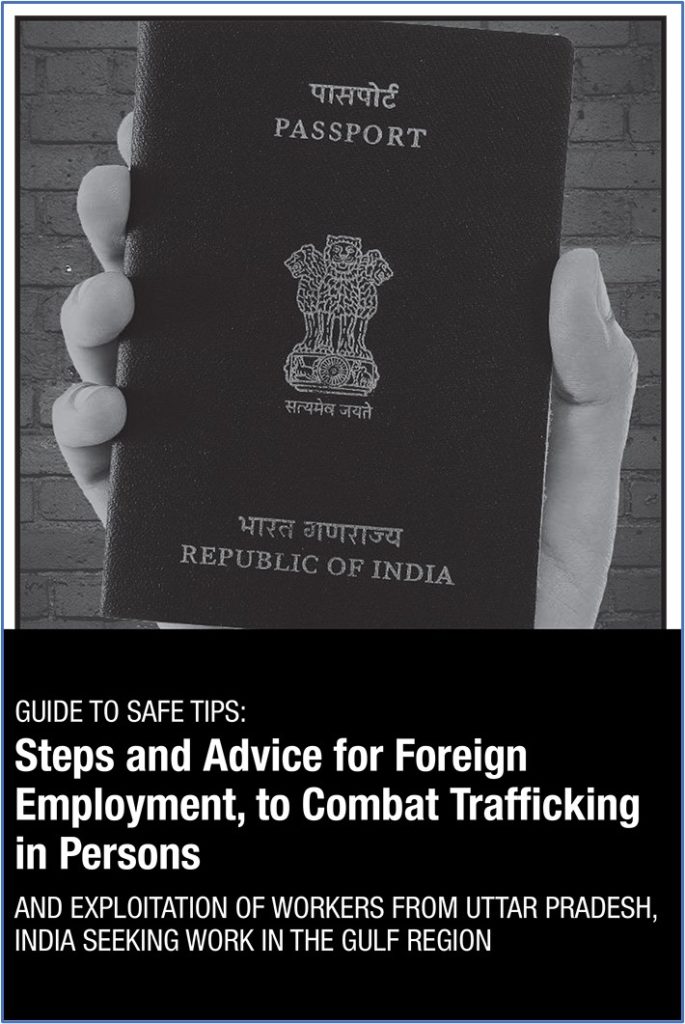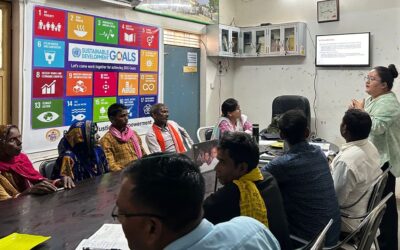Each year hundreds of thousands of workers from Uttar Pradesh, India, travel to jobs in Qatar, the United Arab Emirates (UAE), and Saudi Arabia, as well as to other countries in the Gulf region such as Jordan. These workers travel far from home for a foreign job in hopes of earning a greater income and working toward a better life for their families.
Of all the states in India, Uttar Pradesh (UP) is among those that send the greatest number of workers to Gulf countries. Workers from UP are mainly hired for “low-wage” jobs in the Gulf region. Many find jobs as laborers, masons, electricians, and carpenters in the construction sector, or as drivers, groundskeepers, or manual laborers in hotels or airports.
Many workers from UP have a successful foreign employment experience in which they are treated fairly by their employer, earn a fair salary, send funds back home, and save money to secure a better future for themselves and their families. While foreign employment can present promising opportunities, workers need to be equally aware of the risks they may face that can become barriers to a successful foreign employment experience, and which can result in not earning anticipated wages, exploitation by a foreign employer, and other disappointing outcomes.
Although employment and wage-earning occurs in a foreign country, the risks of an unsuccessful foreign employment experience originate during the job seeking process in UP, before a worker has left India. Indians seeking employment may receive false information from a labor agent regarding the job offered – for example, about the nature of the work and wages promised; they may receive fraudulent documentation, gain debt by paying a labor agent high fees, which can lead to debt bondage.
Workers who receive incorrect documentation in India, such as a tourist visa instead of a work visa to enter the country in which the job will take place, are, after the worker has arrived at the foreign job, extremely vulnerable to harassment or abuse, including withholding of wages, from an employer who exploits the worker’s fear of imprisonment in the foreign country, or deportation back to India. In such cases, workers might end a foreign job in greater debt and in a more vulnerable position than before they sought a foreign job.
The COVID-19 pandemic of 2020-2021 has presented additional challenges for workers. During the pandemic, it has been documented that thousands of low-wage foreign workers in the Gulf region have been denied wages for six months or longer, have lived in unhealthy workers’ accommodations, and have been denied access to healthcare.
The purpose of this SAFE TIPS guide, created by Verité, Free the Slaves and MSEMVS, is to support civil society and community-based organizations in Uttar Pradesh to raise awareness among workers and their communities about the risks that workers face in seeking foreign employment, and the practical steps they can take to protect themselves.
“The SAFE TIPS Guide for Indian workers is designed to support civil society and community-based organizations to provide guidance to workers at the earliest stages of international labor migration,” says Verité Senior Program Manager, Research & Policy Sarah Lince. “Verité’s research and worker interviews have found that workers face significant vulnerability to risks of forced labor during the jobseeking and recruitment steps which occur in India, before the worker has left home for a foreign job. Common risks include vulnerability to debt bondage, as well as different forms of coercion and deception which contribute to unfree consent to a job. The SAFE TIPS Guide orients users to the steps workers can take to build resilience to forced labor risks, particularly during jobseeking, negotiation with labor agents, recruitment, and preparing for transit to a foreign job. The SAFE TIPS guidance also supports workers to reach their goals for taking a short-term foreign job, such as a higher income and/or beneficial professional experience to improve their family’s livelihood after returning home.”
Training of community organizers is now underway by Free the Slaves to help spread the messages from the manual to Indian migrants.




